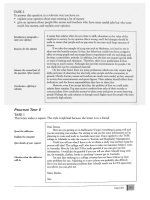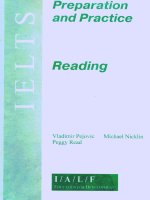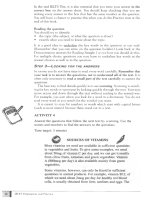Preparation and Practice Reading Writing Academic Module PART 1
Bạn đang xem bản rút gọn của tài liệu. Xem và tải ngay bản đầy đủ của tài liệu tại đây (9.29 MB, 75 trang )
Reading and Writing
ACADEMIC MODULE
Preparation
and Practice
Reading and Writing
ACADEMIC MODULE
Wendy Sahanaya
Jeremy Lindeck
Richard Stewart
INDONESIA AUSTRALIA LANGUAGE FOUNDATION
OXFORD
UNIVERSITY PRESS
OXFORD
UNIVERSITY PRESS
253 Normanby Road, South Melbourne, Victoria 3205, Australia
Oxford University Press is a department of the University of Oxford.
It furthers the University's objective of excellence in research, scholarship,
and education by publishing worldwide in
Oxford New York
Auckland Cape Town Dar es Salaam Hong Kong Karachi
Kuala Lumpur Madrid Melbourne Mexico City Nairobi
New Delhi Shanghai Taipei Toronto
With offices in
Argentina Austria Brazil Chile Czech Republic France Greece
Guatemala Hungary Italy Japan Poland Portugal Singapore
South Korea Switzerland Thailand Turkey Ukraine Vietnam
OXFORD is a trade mark of Oxford University Press
in the UK and in certain other countries
© Wendy Sahanaya, Jeremy Lindeck, Richard Stewart 1998
First published 1998
Reprinted 1999, 2000 (twice), 2001 (three times), 2003 (twice), 2004 (twice], 2005, 2006
This book is copyright. Apart from any fair dealing for the purposes
of private study, research, criticism or review as permitted under the
Copyright Act, no part may be reproduced, stored in a retrieval system,
or transmitted, in any form or by any means, electronic, mechanical,
photocopying, recording or otherwise without prior written permission.
Enquiries to be made to Oxford University Press.
Copying for educational purposes
Where copies of part or the whole of the book are made under Part VB
of the Copyright Act, the law requires that prescribed procedures be
followed. For information, contact the Copyright Agency Limited.
National Library of Australia
Cataloguing-in-Publication data:
Sahanaya, Wendy. 1940-.
IELTS preparation and practice: reading and writing:
academic module.
ISBN 0 19 554093 X.
ISBN 978 0 19 554093 2.
1. English language - Examinations. 2. International English
Language Testing System. 3. English language -
Examinations, questions, etc. I. Title. II. Title:
International English Language Testing System preparation
and practice. (Series; IELTS preparation and practice).
428
Typeset by Stephen Chan
Printed through Bookpac Production Services, Singapore
Contents
Preface How to use this hook
Section 1 The Reading test
IV
About the Reading test
Practice Reading test 1
The question types
Overview questions
Specific information questions
Viewpoint questions
Summarising questions
Practice Reading tests 2 and 3
Section 2 The Writing test
1
5
16
16
30
55
66
75
About the Writing test
Task 1
Describing graphs
Describing charts
Language of comparison
Describing rabies
Process description
How Task 1 is assessed
Discussion of sample essays
Task 2
Topic/Focus
Brainstorming
Writing the essay
The introduction
The argument
The conclusion
Organising the paragraph
Cohesion
Grammar - Tense check
Test tips
100
101
102
116
119
122
127
131
131
137
137
139
140
140
141
143
144
146
149
Reading and Writing
Suggestions for further practice
Answer key
154
156
157
Acknowledgments
Reading answer sheet
171
172
Preface
How to Use this Book
There are two main sections to this book: the reading and the writing. The
Practice tests and the exercises have been numbered separarely in each section.
Answers for the exercises and the Practice tests are in the Answer Key at
the end of the book.
Section 1 Reading
Section 1 gives you:
• an overview of the test which describes the Academic Reading, the form
of the instructions and the question types.
• a Practice Reading test. You should do this test giving yourself exactly
one hour.
• the question types in detail. For each question type there is an
Explanation at the beginning. The purpose of this explanation is to help
you understand the purpose of the question type and learn the appropri-
ate skill for answering the question. After the explanation, there is a
Practice and Discussion section. Here useful skills and strategies will be
explained in detail. Then there are exercises for you to practise the skills.
Follow the instructions for each activity and, when you have finished,
check your answers in the Answer Key. Because working fast and effi-
ciently is very important in tests, many exercises have a Time target. The
Time target gives you a suggested rime limit for the activity.
• two Practice Reading tests.
Section 2 Writing
Section 2 begins with an overview of the Writing test and the instructions
then describes in detail the two Writing tasks.
You can do the sections in any sequence you wish.
iv IELTS Preparation and Practice
About the Reading Test
The IELTS Academic Reading test takes 60 minutes.
There is a question booklet which contains all the instructions, the reading
passages and the questions.
There is an answer sheet (on the back of the Listening test answer sheet).
You must put all your answers on the answer sheet while you are reading.
There is no time allowed at the end for transferring answers.
The test is divided into three sections. Each section is more difficult than
the one before. Each reading passage is between 700 and 1000 words long.
There are between 38 and 42 questions. The questions may come before or
after the readings. There is a variety of possible question types. There may be
examples of how to answer the questions. There is a more detailed explana-
tion of the questions later in the book.
You may mark or write on the question paper, but all answers must be
written on the answer sheet. Remember you must write your answers on the
answer sheet as you go. Unlike in the Listening test, there is no time to trans-
fer them at the end of the test.
Getting the Instructions Right
The written instructions in the reading booklet are always given in italics.
Important aspects of the instructions are also in BOLD ITALIC CAPITALS.
The instructions in the Reading test depend on the type of question. As
you work through this book, take particular note of instructions. Getting to
know the instructions now means that you will be able to see quickly what
you have to do in the actual test and will be less likely to make the more
common mistakes.
The Reading Test
Following are seven examples of instructions which are typical of those you
will find in the IELTS Academic Reading booklet. Read each of the instruc-
tions below and the explanations that follow.
EXAMPLE 1
Questions 1-5
Choose the appropriate letters A-D and write them in boxes 1-5 on your
answer sheet.
This instruction typically applies to multiple-choice questions. One of the
answers - A, B, C or D - will be the correct answer.
EXAMPLE 2
Questions 11-15
Reading Passage 2 has five sections A-E. Choose the most suitable
heading for each section from the list of headings below. Write the appro-
priate numbers (i-ix) in boxes 11—15 on your answer sheet.
Note: There are more headings than sections so you will not use all of
them. You may use any heading more than once.
This means the sections are given the headings A, B, C, D and E. The answer
choices, (i.e. the headings) usually appear in a box and will be numbered
using roman numerals. You will write those roman numerals on your answer
sheer.
There are always extra headings. Although you are told 'You may use any
heading more than once.' you will rarely need to do so.
There can be a question of this type asking for a heading for only one para-
graph or a heading for the whole passage.
Often there will be an example given. It is unlikely this example will be
used again.
EXAMPLE 3
Questions 11-15
Choose ONE phrase A-F from the list to complete each key point.
Write the appropriate letters A-F in boxes 11-15 on your answer sheet.
The information in the completed sentences should be an accurate
summary of points made by the writer.
Note: There are more phrases A-F than sentences so you will not use
them all. You may use any phrase more than once.
This is like the headings instruction. Usually you will have to match the first
half of a sentence with the second half. The completed sentences will always
be paraphrases or summaries of information in the text.
A similar instruction could ask you to match lists of points such as causes
and effects, or advantages and disadvantages.
It is possible that you will use a phrase more than once.
EXAMPLE 4
Questions 12-15
Look at Questions 12-15, Classify the following as linked in the. passage to:
M Mammals
B Birds
F Fish
Write the appropriate letters M, B or F in boxes 12-15 on your answer
sheet.
Again this is rather like the headings instruction. You classify the points given
in each question to the appropriate category in the list.
EXAMPLE 5
Questions 22-27
a Using NO MORE THAN THREE WORDS, answer the following
questions. Write your answers in boxes 22-27.
OR
b Complete the sentence( s) below with words taken from Reading
Passage 3. Use NO MORE THAN THREE WORDS for each answer.
Write your answers in boxes 22-27.
OR
c Complete the table [notes/summary] below. Choose ONE or TWO
WORDS from the passage for each answer. Write your answers in
boxes 22-27.
There are two key points you will always need to check with this instruction
type:
* the number of words you should use for your answer
• where the words come from: the passage or your own words.
The Reading Test
You might have to use the same word or phrase more than once.
The Reading Test
READING PASSAGE 1
You should spend about 20 minutes on Questions 1-13 which are based on Reading Passage 1
on pages 2 and 3.
RELIGIOUS DENTISTRY
B
ali is, without doubt, one of the
most culturally rich islands in the
world. In fact, its carved temples,
dances and immaculately manicured
rice terraces do all seem too perfect to
be true, even down to the people's
smiles. But take a closer look at those
smiles and the perfect teeth do seem a
bit too perfect, and for good reason.
Those flattened teeth are the result of an
important piece of dentistry that every
young Balinese man or woman experi-
ences in their life, known as potong
gig), or tooth filing.
Tooth filing is part of Bali's religious
traditions and is not performed for
cosmetic reasons. In fact, so important
is the tooth filing ceremony that without
it, the Balinese believe they may experi-
ence serious social or behavioural prob-
lems later in life, or their personality
may change altogether.
Balinese religious life is surrounded by
a belief in a variety of deities - gods and
demons that inhabit different levels of
the cosmic and real worlds. These
deities range from the most holy in the
mountains to the lowest that inhabit the
ground and the sea. There are gods and
goddesses in every walk of life which
have special forces of their own. They
inhabit temple statues, trees, even fly
through the air. They exist together in a
dual concept of good and evil, clean and
dirty, etc. As such, both the good and
the evil spirits must be appeased, and
offerings are thus made at the myriad
temples on the island.
It is not only the good spirits that are
worshipped, for Bali has a dark and evil
side too. Terrifying demons and
monsters walk the earth and although
they are seldom seen, they too must be
appeased. These demons can take over
and inhabit the body of an animal or
human and wreak havoc in the commu-
nity, so it is very important to strike a
balance between offerings made to all
spirits that swarm the island. At every
stage in a person's life, he or she is
susceptible to influences of the super-
natural — from demons and layak, to
good spirits which may bring luck.
Purification of the body and mind is
therefore central to Balinese religious
life and the tooth-filing ceremony repre-
sents one such rite of passage from
childhood to becoming an adult.
According to the Balinese, long pointed
teeth resemble the fangs of animals and
these give the person characteristics of
the animal sides of human nature and
ferocity. The Balinese believe there are
six of these evil qualities: desire, greed,
anger, intoxication, irresoluteness and
jealousy. These are liable to flare up,
along with animal instincts, when the
canines are still sharp. To prevent this,
the points of the canines are filed down,
together with any prominent points of
the lower teeth in a special potong gigi
ceremony. Although this may prevent
IELTS Preparation and Practice
The Reading Test
IELTS Preparation and Practice
The Reading Test
IELTS Preparation and Practice
The Reading Test
12
IELTS Preparation and Practice
The Reading Test
13
14
IELTS Preparation and Practice
The Reading Test j 15
The Question Types
IELTS Preparation and Practice
The reading Test
17
18
IELTS Preparation and Practice
The Reading Test
IELTS Preparation and Practice









